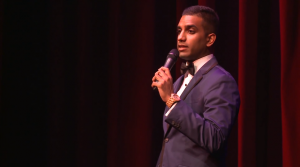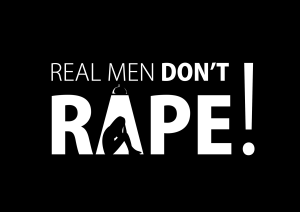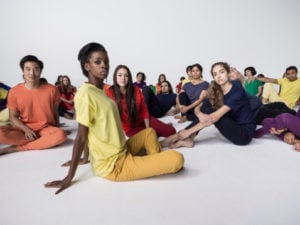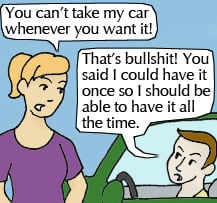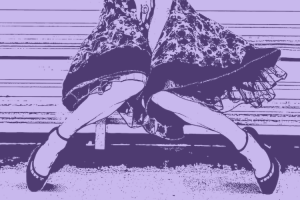
Three people stand, hugging one another, in the middle of a grassy field.
I wish more people made space for imperfection in parenting.
Truth is, becoming someone’s parent doesn’t mean we magically stop making mistakes. Or that we suddenly resolve all our deepest issues, heal from our most incessant hurting, and somehow become better people.
We aspire to be better, perhaps, but it doesn’t always feel like it’s working. For some, like me, being responsible for a whole entire human tugs at our most ambitious, most emotionally sound spaces.
But we don’t always get to that version of ourselves. And the reality that we repeatedly come up short can feel really, really shitty.
What do we do with those shitty feelings, particularly when we struggle with our own learned and internalized ideas of parenting that conflict with the way we want to raise our children?
After all, we are people before we are parents.
I have two daughters, and even though I call them mine, my daughters own themselves.
I want them to feel that ownership now, instead of the traditional parenting perspective that focuses on a child’s future as an adult. Of course, I care about the type of adults they become, but I also care about who they are and how they feel now, which means I need to pay attention to – and honor – the type of people they are today.
Domination and oppression – even (and maybe especially) when done with the oppressed or dominated person’s best interest at heart – isn’t this oddity that begins in adulthood.
It doesn’t just live inside government structures; it’s not just embedded in what we would readily call an “abusive” environment. It also lives inside a longstanding tradition of language and actions intended to save children from themselves, and to help them develop the attributes we believe lend themselves to success in adulthood.
The logic is that children can’t be trusted with their own lives, and so their freedom to make decisions about their lives must be wholly managed by adults – because, apparently, we know better. Essentially, children cannot be free because they wouldn’t know – based on our thinking – how to properly use real liberation.
I veer all the way to the opposite side of that thinking.
The same liberation I, as a black, immigrant woman in America seek for myself, is one that I intend to help create for my daughters as well. This means I have to hold myself accountable when fear-based logic and the “I went through that, and it didn’t kill me” mentality take precedence over respect, regard, and partnership with my daughters.
And I’m not talking about forcing Sally to go to bed at eight when she wants to stay up later, either.
I’m talking about the reality that society believes children need to be molded into certain types of people in order to win in adulthood.
Even though plenty adults would agree that we, ourselves, don’t have life all figured out, we use our beliefs as rationale for a consequence-based approach to what children should do, how they should speak, behave, perform, and learn.
That is a form of oppression in my eyes, and I don’t want that for anyone, child or adult.
All of this brings me face-to-face with the struggles that come with recognizing that as parents, we have a certain privilege – and that privilege can silence our children’s real voices and disconnect them from their intuition.
So let’s look at three complex aspects of navigating parenting privilege – things I still struggle with today – and some ideas on how to move forward with compassion and critical self-reflection as parts of our process.
1. Prioritizing My Daughters’ Liberation
I’ve grown to prioritize liberation; it’s my core value. As a woman of African decent, and a woman born on an island populated largely by the descendants of African slaves, it’s important that I live out my liberation – not just in theory, and not just for myself.
Developing a strong sense of personal agency and confident autonomy is how I’m learning to live freely, and that process is helping me to separate myself from some of the beliefs that dictated my choices without my consent, or despite my opposition.
As I journeyed into adulthood, I recognized systemic oppressions rooted in racist mentalities designed to marginalize and dehumanize black and brown folks.
But there were other ways, particularly during my youth, where my traditional Caribbean upbringing didn’t leave me feeling a sense of dignity, respect, or even regard.
And it’s complicated because those experiences managed to live right alongside all the love and care I got from my parents, grandparents, and our community.
In other words, many adults in my life believed that force, physical punishments, and silencing were part of how they would raise decent, successful adults. And though I felt loved and often safe, there were negative effects, too – and I still struggle with some of those effects today.
Examples include religious practices that didn’t resonate with me; dismissive approaches to my needs; feeling unsafe around certain adults, but not having that matter to the adults who took care of me; being hit by adults because my actions bothered them. Those sorts of things.
I feel more free today, in part because I’m no longer subjected to those forms of silencing or oppression, and my daughters deserve to feel free, too. And to make space for that, I am constantly deschooling from my own broken ideas around my liberation, my blackness, my womanhood, my perspectives as an immigrant, and the multi-layered aspects of my overall identity.
And I also realize that my ideas around children and how they learn and live have been susceptible to the things I no longer agree with – the things (my homegirl, in my mind) Amy Childs, calls “rule-y, school-y beliefs.”
Though I’m unraveling myself from the damaging aspects of more the traditional authoritarian style of parenting, I still sometimes end up recognizing times when I revert to it.
Some of our interactions with our children can counter the equality- and freedom-centered (read: intersectional feminist) approach we prefer to live by.
As I take my bumpy route to feminist parenting, I find that I have to bring compassion and critical self-reflection along for the ride, or else I spend too much time criticizing myself and my daughters, instead of making room for mistakes and progress.
2. Responsibility Versus Ownership
My partner and I include our daughters’ opinions and wants in our decisions as often as possible.
This is how we operate with respect for our children, instead of dismissing their desires and perspectives simply because they’re young. Our shared intention is to treat them with dignity and respect, and to choose communication over control or force, even when it seems so much easier to just make them do things because that’s what we see as best.
But here’s where that gets tightrope tricky: Their inclusion in our decision-making process isn’t always the best thing to do, especially because they’re young now (twelve and ten), and as such, will naturally often opt to do the easiest thing, and not necessarily the best thing.
As their parents, we’re responsible for their wellbeing. And this dynamic calls for us to be “rule-y” at times, directly opposing what they want for themselves.
When those moments inevitably arise, I don’t always end up making the time to talk them through a better choice. Instead, particularly if I’m tired, I just conjure up my Traditional Jamaican Parent mojo and make them do what I think is best.
For example, bodily autonomy is easy to honor when it comes to their clothing choices, whether they want blue or red yarn braided into their locs, or who they want to allow to hug them.
But if they’re really tired from a long evening of play outdoors, and they don’t want to take showers, or they just want to grab fast food instead of something more nutritious, it’s so easy for me to just say, “Eat these damn greens and take that damn shower because I said so, or else.”
As children and adults often do, our girls sometimes just prefer to choose the easiest thing. And in these moments, their father and I can either rely on our positions of privilege, or we can keep dignity and respect at the forefront while still holding firm to certain rules.
Tricky, tricky shit!
It’s important to my partner and me that our children feel listened to and respected, but our daughters won’t always feel that way. And when they don’t get it – which we think is normal because at this stage in their lives, they sometimes lean more toward desire than rationale – it can be really tough not to pull the I’m your Mama, you do what I say card.
The reality is that they won’t always get it, because they’re newer at life, and their priorities at their ages aren’t centered around the same things as mine. Context is different, and needs are different, and so when these situations come up, I give myself permission to remind them of that, so they know I’m considering them, and still firmly assert what I require from them in that moment.
For my partner and me, that’s the best we can do when their needs and our beliefs conflict. And we’re okay with that, even when we’re not sure it’s the best route to take.
3. I’m Not Your Friend, I’m Your Parent
This is about those moments when I’m having a good time with my girls, and they do or say something that makes me feel that I need to Parent Up.
When they try to get out doing their share of chores…
When we visit their grandparents, but the girls want to stare at their iPad screens…
When they ignore my instructions instead of communicating their feelings…
When they intentionally leave out important details to avoid an undesirable result…
When they get attitudes because I won’t give them something they want…
I’m. Not. Having. That. Period.
This, frankly, is probably the aspect of parenting privilege I struggle with most. As free-thinking as I am, and as much as responsibility as I feel for facilitating liberated living for my girls, I still can’t see an option for both giving them what feels like freedom for them, and setting boundaries that I feel they need.
My traditional parenting roots tug extra hard in these situations, and this is where I have to be really present, so as not to use the complexity of these moments as an excuse to treat my children without the dignity and respect they deserve.
When I choose to reprimand them, or present a consequence, I work at remembering that it comes with the parenting territory.
If they’re being selfish or mean, I speak up and I tell them why I’m not okay with their choice. If they are adamant and unrelenting, I might revoke a privilege they enjoy until I see fit to reinstate it.
I don’t like having to do that, and I know they won’t die from lack of iPad time, but I want to make clear to them that in some instances, choosing to disregard rules or other people’s feelings can lead to unnecessary conflict and consequences.
Though I obviously prefer that my daughters are happy most times, I genuinely don’t feel that their happiness is my responsibility; their father echoes that sentiment, so they get a pretty clear signal from both of us when it comes to this.
Their happiness can’t come at the expense of their missing opportunities to practice important life skills like consideration and compassion.
When these particular conflicts arise, our daughters aren’t apprehensive about expressing how they feel either. I’m cool with that because we encourage authentic self-expression (even when it pisses us off), because that’s also a part of really being free. But their father and I try to manage our positions of privilege by making room for discussion, so that they feel heard.
These discussions usually don’t change our minds about whatever action our girls are protesting. What is does, though, is make space for us to share our intentions and our perspectives. And equally important, it makes space for them to say what they feel, and experience our listening to them, offering more perspective and explanations, and being compassionate toward them as they feel their own feelings.
During those discussions, I tell them it’s not my job to make sure they’re happy. Instead, my job is to make sure they’re safe, offer context, and be a liaison between them and the adult world when necessary.
They probably don’t care about any of that right now, but somebody has to. So we all do the best we can.
***
It’s been thirteen years since I’ve become somebody’s mama (two somebodies now), and I’m slowly learning how to recognize my parenting privilege. I’m also learning that to embrace self-mothering by trading in self-criticism for observation, support seeking, and practicing compassion for my own self.
Being mindful about the gap between where we are and where we prefer to be in terms of supporting our children doesn’t mean we have to beat up on ourselves for being imperfect.
Instead, this mindfulness and gentle, consistent shifting is about seeking ways to move out of the oppression we cause, and into the empowerment we desire for the children we love.
The process of unraveling our own privilege and presuppositions around caring for children is ongoing, and it’s okay to recognize that we have more work to do – and to feel conflicted and unsure about how it will all work out.
We can observe, listen, explore, and over time, get better at making space for our children to feel free, supported, regarded, and loved.
[do_widget id=’text-101′]
Akilah S. Richards is a Contributing Writer for Everyday Feminism. She is a six-time author, digital content writer, and lifestyle coach who writes passionately about self-expression, womanhood, modern feminism, location independence and the unschooling lifestyle. Connect with Akilah on Instagram, Tumblr, or her #radicalselfie e-home, radicalselfie.com. Read her articles.
Search our 3000+ articles!
Read our articles about:
Our online racial justice training
Used by hundreds of universities, non-profits, and businesses.
Click to learn more





